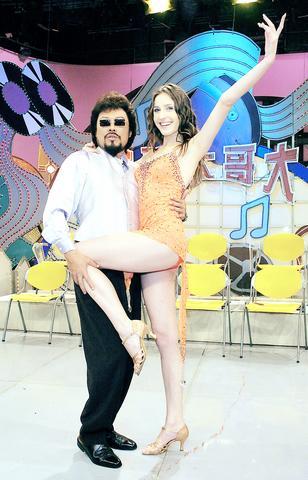Margarita Laurouskaya (
Well, a mermaid, actually. She came to Taiwan about four years ago from Belarus Athletic University along with a few classmates to join a team of synchronized swimmers that would perform nightly shows at a Taichung theme park that might be better described as a burlesque.

PHOTO: TAIPEI TIMES
Troupes of girls predominantly from former Soviet bloc states -- jin si mao (

PHOTO: TAIPEI TIMES
"My mother was working in a company where she could check all about the place where I was supposed to work and about Taiwan," she said in an interview this week. "She did a lot of checking and felt it was a legitimate show. So I came."
She and her classmates chose to abandon their university studies because the show would have them earning more in six months than they'd make in a year in Belarus. And so Margarita became a mermaid and had her picture blown up large on the show's poster.
"It was easy," she said of her experience in the show. "In Belarus we train to do this from when we're little and now we can do it here and make money. We don't have this kind of stuff in my country. We just do championship stuff. So everyone looks for work at water parks in Japan, France, America ? and Taiwan."
But after eight months in a scaly Spandex mermaid suit, Margarita was swum out. She returned to Belarus for about six months but decided her prospects were better back in Taiwan.
"I didn't want to jump from here ? to here," she said using her hands to indicate a precipitous drop.
But success in Taiwan meant having to learn the language. She'd met an agent, Kelly Chin (金玉珮), who said she could get her on television if she could speak Chinese. So Margarita holed-up in her apartment, leaving only to eat, attend Chinese class and for occasional modeling assignments. The rest of the time she spent watching television -- not for entertainment as much as education.
"I would really listen to what they were saying. This is how I learned Chinese," she said. "But you can't just learn the language, you have to learn the culture too."
Her break came a year later when Apple Daily (蘋果日報) ran a full-page pictorial on synchronized swimming that featured her. Taiwan's popular television host, Chang Fei (張菲), got one look at Margarita the mermaid and reeled her in.
She's been swimming, dancing and donning an endless array of bikinis on Chang's show every week since the beginning of this year -- earning a reported NT$200,000 a month for her troubles -- and was rumored to have danced her way into Chang's heart.
So is there anything going on between she and Chang?
"No."
Isn't he interested in her?
"I don't know," she said, then turned to ask her agent, Chin, who chaperoned her interview. "Is Chang Fei interested in me?"
"He's that way with all the girls," Chin says.
What about the guy Next magazine surreptitiously photographed her with? Margarita managed to look coy in a leopard-print bikini on the magazine's cover two weeks ago and an inside expose showed pictures of her with her "boyfriend" -- a guy far younger and less hirsute than Chang.
"That's my roommate," she explains. "Next magazine and Apple Daily followed me for two weeks trying to find something to write about. But there isn't anything. I'm too busy to have a boyfriend. I don't have time to go out."
Her schedule is taken up, she says, by taping Chang's show on Tuesdays, meeting to decide the content of the next week's show on Friday, and spending all weekend preparing for it. Rehearsals can be all-consuming. Weeks ago, she had to rent a gu zhen (
"The rest of the week, I have modeling shoots and press conferences," she said. "And I have a biography coming out later this month. It's all ready, except for the photos."
But for all the time she spends wearing bikinis in front of cameras, Margarita doesn't consider herself a professional model. Her job, she says, is simply to entertain people.
"I tried doing the serial television programs," she said, "but filming those shows isn't fun. I think you should have fun doing the show. The audience will see that and they'll have fun too."
It's a good philosophy, gauging by the reaction of people who watch her every week.
"Her ballet maybe isn't very professional, but it looks great on television!" said one avid watcher. "She's great because she comes across as nice and sweet and you can tell she really likes Taiwan."
Her goal, she says, is to host a television program of her own, but she doesn't rule out getting involved in film either.
"I just want to be a part in something that is quality," she said, emphasizing the word "part."
Asked if she's afraid that her fame is fleeting, Margarita reveals a side to her personality that likely helped gain her fame in the first place.
"Of course, all this won't last," she said smiling. "But I'm happy and feel very lucky for everything that has happened. I can always teach kids how to swim."

June 2 to June 8 Taiwan’s woodcutters believe that if they see even one speck of red in their cooked rice, no matter how small, an accident is going to happen. Peng Chin-tian (彭錦田) swears that this has proven to be true at every stop during his decades-long career in the logging industry. Along with mining, timber harvesting was once considered the most dangerous profession in Taiwan. Not only were mishaps common during all stages of processing, it was difficult to transport the injured to get medical treatment. Many died during the arduous journey. Peng recounts some of his accidents in

What does the Taiwan People’s Party (TPP) in the Huang Kuo-chang (黃國昌) era stand for? What sets it apart from their allies, the Chinese Nationalist Party (KMT)? With some shifts in tone and emphasis, the KMT’s stances have not changed significantly since the late 2000s and the era of former president Ma Ying-jeou (馬英九). The Democratic Progressive Party’s (DPP) current platform formed in the mid-2010s under the guidance of Tsai Ing-wen (蔡英文), and current President William Lai (賴清德) campaigned on continuity. Though their ideological stances may be a bit stale, they have the advantage of being broadly understood by the voters.

Artifacts found at archeological sites in France and Spain along the Bay of Biscay shoreline show that humans have been crafting tools from whale bones since more than 20,000 years ago, illustrating anew the resourcefulness of prehistoric people. The tools, primarily hunting implements such as projectile points, were fashioned from the bones of at least five species of large whales, the researchers said. Bones from sperm whales were the most abundant, followed by fin whales, gray whales, right or bowhead whales — two species indistinguishable with the analytical method used in the study — and blue whales. With seafaring capabilities by humans

In a high-rise office building in Taipei’s government district, the primary agency for maintaining links to Thailand’s 108 Yunnan villages — which are home to a population of around 200,000 descendants of the Chinese Nationalist Party (KMT) armies stranded in Thailand following the Chinese Civil War — is the Overseas Community Affairs Council (OCAC). Established in China in 1926, the OCAC was born of a mandate to support Chinese education, culture and economic development in far flung Chinese diaspora communities, which, especially in southeast Asia, had underwritten the military insurgencies against the Qing Dynasty that led to the founding of